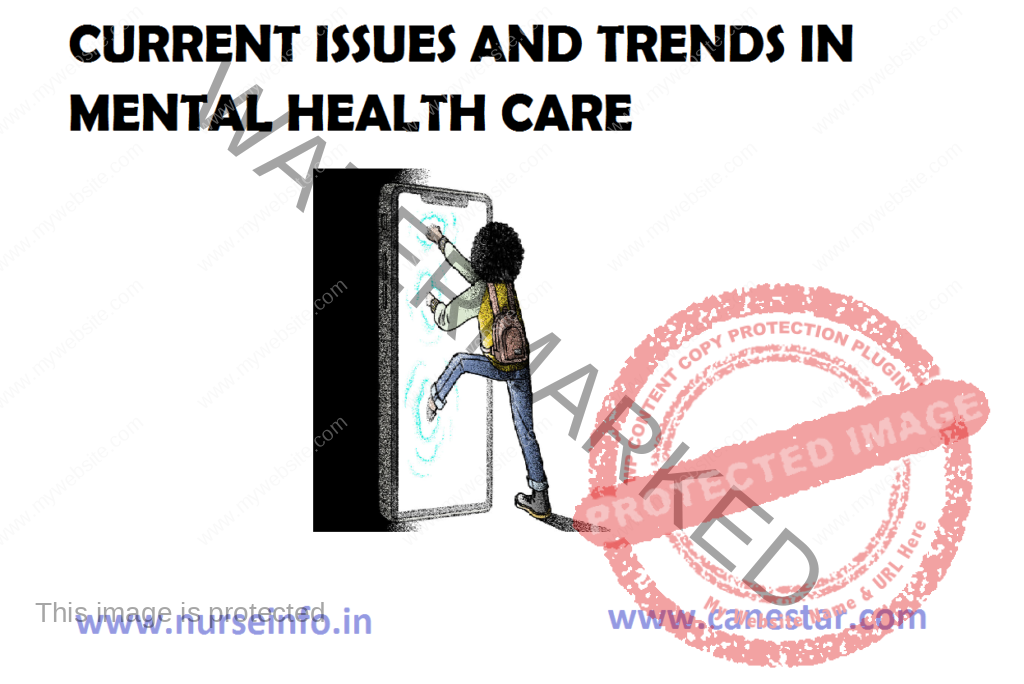CURRENT ISSUES AND TRENDS IN MENTAL HEALTH CARE
UPDATED 2024
A Psychiatric nurse faces various challenges because of changes in the inpatient care approach. Some of these changes that affect her role are as follows:
Trends in Health Care
- Increased mental health problems
- Provision for quality and comprehensive services
- Multidisciplinary team approach
- Providing continuity of care
- Care provided in alternative settings
Economic Issues
- Industrialization
- Urbanization
- Raised standard of living
Changes in Illness Orientation
- Shift from illness to prevention (modification of style), specific to holistic, quantity of care to quality of care
Changes in Care Delivery
- Care delivery is shifted from institutional services to community services, genetic services to counseling services, nurse patient relationship to nurse-patient partnership.
Information Technology
- Telenursing
- Telemedicine
- Mass media
- Electronic systems
- Nursing informatics
Consumer Empowerment
- Increased consumer awareness
- Awareness of the community in early detection and treatment of mental illness as well as proper utilization of available psychiatric hospitals
- Patients are health care consumers demanding quality health care services at affordable cost with less restrictive and more humane rates.
Deinstitutionalization
- Bringing mental health patients out of the hospital and shifting care to community.
Physician Shortage and Gaps in Service
- Physician shortage can provide the opportunity for new roles, for example, nurse practitioner. In respect to gaps in services, nurses always meet the needs of people for whom services are not available, for example, home visiting nurse.
Demographic Changes
- Increasing number of the elderly group
- Type of family (Increased number of nuclear families).
Change in Patient Needs
- Wanting a more holistic orientation in health care.
Challenges in Psychiatric Nursing
- Knowledge development, dissemination and application
- Overcoming stigma
- Health care delivery system issues
- Impact of technology
Educational Programs for the Psychiatric Nurse
- Diploma in Psychiatric Nursing (The first program was offered in 1956 at NIMHANS, Bengaluru)
- MSc in Psychiatric Nursing (The first program was offered in 1976 at Rajkumari Amrit Kaur College of Nursing, New Delhi)
- Mphil in Psychiatric Nursing (1990, MG University, Kottayam)
- Doctorate in Psychiatric Nursing (offered at MAHE, Manipal; RAK College of Nursing, Delhi; NIMHANS, Bengaluru, National Consortium for PhD in Nursing under RGUHS, Karnataka, etc)
- Short term training programs for both the degree and diploma holders in nursing
Standards of Mental Health Nursing
The development of standards for nursing practice is a beginning step towards the attainment of quality nursing care. The adoption of standards helps to clarify nurses areas of accountability, since the standards provide the nurse, the health agency, other professionals, patients, and the public, with a basis for evaluating practice. Standards also define the nursing profession’s accountability to the public. These standards are therefore a means for improving the quality of care for mentally ill people.
Development of Code of Ethics
This is very important for a psychiatric nurse as she takes up independent roles in Psychotherapy, behavior therapy, cognitive therapy, individual therapy, group therapy, maintains patient’s confidentiality, protects his rights and acts as patient’s advocate.
Legal Aspects in Psychiatric Nursing
Knowledge of the legal boundaries governing psychiatric nursing practice is necessary to protect the public, the patient, and the nurse. The practice of psychiatric nursing is influenced by law, particularly in its concern for the rights of patients and the quality of care they receive.
The patient’s right to refuse a particular treatment, protection from confinement, intentional torts, informed consent, confidentiality, and record keeping are a few legal issues in which the nurse has to participate and gain quality knowledge.
Promotion of Research in Mental Health Nursing
The nurse contributes to nursing and the mental health field through innovations in theory and practice and participation in research.
Cost-effective Nursing Care
Studies need to be conducted to find out the viability in terms of cost involved in training a nurse and the quality of output in terms of nursing care rendered by her.
Focus of Care
A psychiatric nurse has to focus care on certain target groups like the elderly, children, women, youth, mentally retarded and chronic mentally ill.

NURSING PROCEDURES LIST CLICK HERE

